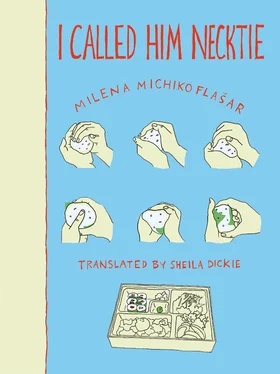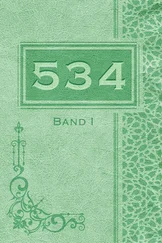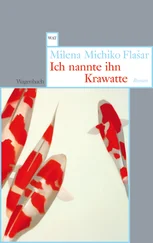Or Hiroko, the fat one. She thought she would dissolve into nothing at any moment. Can you see me, she asked. Do you see how I am disappearing? Yet her body was so plump you couldn’t imagine how it would ever disappear. Where are my toes, she asked, my feet, my knees. Full of horror, she felt her legs and screamed: I feel a void. In the end she had to be fed through a tube, because she was convinced she no longer had a mouth.
109
Why am I telling you this? Illness, I think, is holding onto an illusion. The loneliness while you’re holding onto it. If I say I don’t know whether I’m better, it’s because I don’t know whether that’s even possible. To be completely free. But: Yes. For the last half year I have really been so well that I gradually began to find pleasure in imagining bumping in to you, and telling you that I am genuinely pleased to see you again. A curiosity within me: What’s coming next? Wonderful. Such curiosity: Where is it all going? In the morning I get up and experience, as I wash my face, a simple pleasure in being so curious. The water is alive. It rinses the sleep out of my eyes, wakes me up. It’s as if I first have to practice being as alive as the water.
Of course for my parents it’s difficult. I see that now. That it is difficult for them, this vision they had of seeing me smashed to pieces. Not being able to hold onto that. For my father especially it’s a severe loss. He’s reluctant to talk about what happened, and when he does, he says he would rather I had gone on writing poems instead of being ill. He just says that in passing. With eyes brimming. Looks away when he adds: Would much rather you had written a long, long poem. I hear the apology in it. I hear it because I want to hear it. An effort of will, I owe it to him. It makes things easier for him. He doesn’t lose face. It makes it easier for me, I can reinvent myself. In this way we’re each in our own space and some time, who knows when, we’ll meet and sit in one space big enough for both of us, and then we’ll understand: We were never anywhere else.
110
Am I still writing? Unthinkable not to. In the very darkest night the words were like shiny pebbles. They caught the light of the moon and stars and reflected it back. One word among them that shone especially brightly. Simplicity. I would approach it, stepping softly, regard it from all sides, finally pick it up, enchanted by it, recognize that its enchantment lay in its shine, its pure meaning. Simplicity. To simply be there. Simply keep going. The longer I kept going, the easier it was to see how beautiful, simply beautiful, it is to be here.
I would like to write about how this word shines. I’d like to write about the simplest things. About, for example, how we’re sitting at this table now, across from each other, after two and a half years, telling each other things we usually conceal. The green tea latte we’re drinking is lukewarm, it tastes sweet. It will be dusk soon. The day is slipping into night with the sun. We notice lots of time has passed. My leg, extended, reminds us of that. You’re not blaming me. We’re friends, more than that, you know: Twins who turn to each other over half-filled glasses. I missed you. You missed me. So simple. The air conditioner hums. People are talking, laughing. The waitress runs to and fro and when she does stop, she wipes her apron over her tired face.
111
And Kumamoto had not changed.
Despite his sedateness, despite his bloated body, he sat before me as a poet through and through, he had maintained his integrity. He radiated a fierce strength, a man who had descended into the abyss, totally alone, and had taken its measure. And once he was out again he was the same man, just happy to be out.
What do you think? I laid my hand flat on the table so that he could see the scars. Do you think we are needed? I mean people like us, who have strayed from the path, withdrawn? Who have no diploma, no education, no work, nothing to show, have learned nothing except this: That it is worth it to stay alive. It worries me, the thought that we may not be needed now, after we have learned that and are still learning. We are marked, after all. We have a flaw. What if it is not forgiven? What if society… won’t have us back?
I avoid thinking of the big picture. If I think: Society. Then my head spins. Too big. What is that? I can’t see it. What I see are details. That’s what I want to stay with. With small things. And there, everyone is marked, everyone has a flaw, everyone needs each other. Kumamoto laid his hand beside mine. When I found you again just now, fingertip to fingertip, it was a moment. At first I did not recognize you. You’ve grown thinner. It was only when you let go of the strap in the swaying train and were gently thrown to and fro that I recognized you by the way you pushed back with your feet on the floor, against the pressure. The doors sprang open. I got up immediately. Following you. I didn’t want to lose sight of you again. You were quick, by the escalator already. I could hardly keep up. Stumbling after you I realized how much I need you. I need you so I can tell you: I’m sorry. I need you, so I can hear from you: It’s alright. You stopped for a moment. I hesitated. Overwhelmed by the feeling that I had no right to need you so much. But you were standing there. I reached out my hand towards you, and, that’s the answer to your question, perhaps it really is this reaching out, this reaching towards someone else, that’s needed most of all.
Do you have any plans, I asked.
You?
To fully emerge.
Me too.
112
The other thing I wanted to ask you: What did you, just before you, what did you call out then? You do know. I was coming towards you. And you called out something. The whole time I’ve been convinced it was a message for me. Something I should hear. Something that was intended for me. What was it?
I was confused.
Have you forgotten?
I don’t think it was anything.
No?
What’s the point of repeating it?
Perhaps to…
I am telling you: It was nothing.
Actually, it no longer mattered to me. A cry from the past, it was fading away. Whether it was freedom, life or happiness, it was no longer important. We bade each other farewell with a simple goodbye. We’ll bump into each other again, said Kumamoto. We will, I said, and take care. You too. For my sake. And with that he disappeared behind somebody’s broad back. He would go home. Go home. Suddenly I was aware of a great hunger. A hole in my stomach, I rushed off. Hunger drove me on.
113
Father’s shoes in the entrance. Polished leather, you could almost see yourself in them. My parents were sitting down to dinner. The television was on. Baseball. The Giants were ahead by three runs. I saw in the hall, surprised that I wasn’t surprised, that the picture I shoved in the trash not long ago hung in its place again. Under it a notice fixed with thumbtacks: I have the negative. However often you may remove the picture, I can get another made. Mother. Smiley face. The family is multiplying. There I stood again, Father’s hand on my shoulder, crooked cap, in front of the Golden Gate Bridge, and waited for the grain of sand to run through the hourglass, to shake off the hand, and — waited a little longer, until my bitterness over it had faded. Or as Kumamoto would have said: Because I didn’t want to feel any bitterness, I didn’t. It was a conscious effort. I owed it to myself. It made things easier for me. Without bitterness I picked up the tray from beside the door, the bowl of rice was still steaming, took a carefully considered step, then a second one, opened the door with a hand that wasn’t trembling. Wide eyes regarded me. A mute nod. Father broke the silence first. Well, clear the chair, he said, turning to Mother. On my chair, the chair I had not sat on for two years, lay a pile of old magazines, the Crown Princess waving a hand, a ball of red wool, knitting. Mother hurried to clear it off. As she did, the ball of wool fell in front of her, on the floor, and rolled to my feet. I nudged it on towards Father. A home run. I sat down. Itadakimasu*.
Читать дальше












